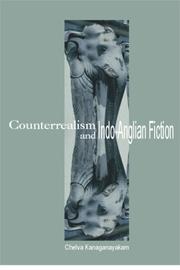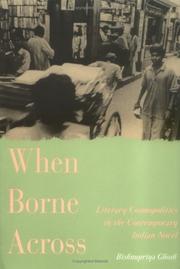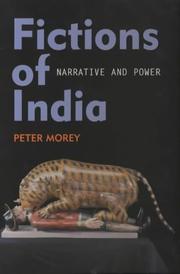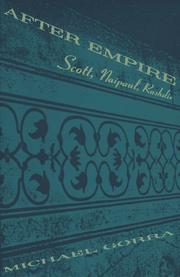| Listing 1 - 10 of 14 | << page >> |
Sort by
|
Book
ISBN: 1443884677 9781443884679 1443877964 Year: 2015 Publisher: Newcastle upon Tyne, England : Cambridge Scholars Publishing,
Abstract | Keywords | Export | Availability | Bookmark
 Loading...
Loading...Choose an application
- Reference Manager
- EndNote
- RefWorks (Direct export to RefWorks)
This volume brings together a number of recent critical essays on aspects of gender discourse visible in Indian English fiction. The articles included here address the multiple aspects of gender identity and open up doors for a number of varied interpretations. The authors considered range from Saratchandra to R Raj Rao, from Jhabvala to Manju Kapur. The contributions investigate a range of features of gender discourse, including feminism, masculinity, and homosexuality. As such, the volume represents an indispensable companion to any scholar of gender studies interested in the perspectives pr
Indic fiction (English) --- History and criticism. --- Women authors
Book
ISBN: 9786611998745 1281998745 0191567639 9780191567636 9780199544387 0199544387 6611998748 0199544379 9780199544370 9781281998743 1383045119 Year: 2009 Publisher: Oxford New York Oxford University Press
Abstract | Keywords | Export | Availability | Bookmark
 Loading...
Loading...Choose an application
- Reference Manager
- EndNote
- RefWorks (Direct export to RefWorks)
This text provides an informed and lively introduction to the Indian novel in English which is now a fixture on the international literary scene.
Indic fiction (English) --- English fiction --- Indic literature (English) --- History and criticism.
Book
ISBN: 1443852147 9781443852142 1299974112 9781299974111 1443849510 9781443849517 1443849510 9781443849517 Year: 2013 Publisher: Newcastle upon Tyne Cambridge Scholars Publishing
Abstract | Keywords | Export | Availability | Bookmark
 Loading...
Loading...Choose an application
- Reference Manager
- EndNote
- RefWorks (Direct export to RefWorks)
World
Indic fiction (English) --- English fiction --- Indic literature (English) --- History and criticism.

ISBN: 1280925574 9786610925575 0889207496 9780889207493 9780889203983 0889203989 1554580625 Year: 2002 Publisher: Waterloo, Ont. : Wilfrid Laurier University Press,
Abstract | Keywords | Export | Availability | Bookmark
 Loading...
Loading...Choose an application
- Reference Manager
- EndNote
- RefWorks (Direct export to RefWorks)
What do R.K. Narayan, G.V. Desani, Anita Desai, Zulfikar Ghose, Suniti Namjoshi, and Salman Rushdie have in common? They represent Indian writing in English over five decades. Vilified by many cultural nationalists for not writing in native languages, they nonetheless present a critique of the historical and cultural conditions that promoted and sustained writing in English. They also have in common a counterrealist aesthetic that asks its own social, political, and textual questions. This book is about the need to look at the tradition of Indian writing in English from the perspective of counterrealism. The departure from the conventions of mimetic writing not only challenges the limits of realism but also enables Indo-Anglian authors to access formative areas of colonial experience. Kanaganayakam analyzes the fiction of writers who work in this vibrant Indo-Anglian tradition and demonstrates patterns of continuity and change during the last five decades. Each chapter draws attention to what is distinctive about the artifice in each author while pointing to the features that connect them. The book concludes with a study of contemporary writing and its commitment to non-mimetic forms.
Book
ISBN: 9042028343 9789042028340 Year: 2009 Publisher: Amsterdam New York Rodopi
Abstract | Keywords | Export | Availability | Bookmark
 Loading...
Loading...Choose an application
- Reference Manager
- EndNote
- RefWorks (Direct export to RefWorks)
Raja Rao, one of the founding figures of Indian English literature, is re-examined in this comprehensive study of his fiction, which offers a fresh critical investigation into both his short stories and his novels. Powerfully contradicting the long-held perception of Raja Rao as a mere metaphysical writer and the true bard of quintessential Indianness, projected by many critics of the first Commonwealth generation over three decades, Stefano Mercanti posits Rao’s fiction in terms of its dialogic interaction – the ‘partnership’ – between Western and Eastern cultural traditions and demonstrates how it evolves during the course of his oeuvre on both the philosophical and the political level. The title, The Rose and the Lotus , signals the discursive terrain for a multicultural and interwoven evolution among different cultures, and points to the need for valuing relations of reciprocity rather than those of domination. Far from conveying univocal configurations and nationalistic stereotypes, Rao’s idea of India is seen as the epicentre of many echoes and dynamic resonances, both Western and Eastern, through which a distinct blend of Indian and European influences is more clearly unravelled. In this new critical re-appraisal, Mercanti draws on non-binary and inter/multi-disciplinary paradigms, thus signalling the complex transformations and multiple negotiations of a polyglot India caught between the cultural twilight of the modern and the traditional. The study also offers an invaluable linguistic analysis of Rao’s experiment with the English language, supplemented by a detailed glossary.
Indic fiction (English) --- History and criticism. --- Raja Rao --- Raja Rao. --- Criticism and interpretation. --- 1900-1999 --- India --- In literature.

ISBN: 0813533457 0813533449 0813560241 0813537096 9780813537092 9780813533445 9780813533452 Year: 2004 Publisher: New Brunswick, N.J.
Abstract | Keywords | Export | Availability | Bookmark
 Loading...
Loading...Choose an application
- Reference Manager
- EndNote
- RefWorks (Direct export to RefWorks)
Indic fiction (English) --- Politics and literature --- Cosmopolitanism --- Political science --- Internationalism --- History and criticism. --- ROMAN DE L'INDE DE LANGUE ANGLAISE --- POLITIQUE ET LITTERATURE --- COSMOPOLITISME --- 20E SIECLE --- HISTOIRE ET CRITIQUE --- INDE

ISBN: 058545082X 9780585450827 0748611819 9780748611812 Year: 2022 Publisher: Edinburgh
Abstract | Keywords | Export | Availability | Bookmark
 Loading...
Loading...Choose an application
- Reference Manager
- EndNote
- RefWorks (Direct export to RefWorks)
GBS_insertPreviewButtonPopup('ISBN:9780748611812);Fictions of India explores the relation of narrative technique to issues of power in the work of selected writers dealing with India. It examines the imperial context in which the writers operate and suggests how historical and ideological assumptions and anxieties may be read into the texts they produce. The study combines aspects of colonial and post-colonial debate with narrative theories to illuminate the work of these writers operating on either side of an epistemological divide formed by Indian independence in 1947.The book focuses largely on British writers on India with chapters on Kipling, E.M. Forster, John Masters, J.G. Farrell and Paul Scott. A final, comparative chapter traces the issues of narrative and power in the work of two post-independence Indian writers - Khushwant Singh and Rohinton Mistry - and deals with the burden of storytelling in a post-colonial situation still fraught with communal and neo-colonial abuses.This book is an important contribution to our understanding of how narrative fiction can reflect and confirm, but also contest and dismantle discourses of power.Key FeaturesOffers new interpretations of well-known texts and writersSuggests an agenda for studying new and less well-known texts to examine the play of narrative and power more generallyDemonstrates possible relations between narrative technique and those larger narratives which feed into the operation of political powerChallenges exclusivist readings which have often asserted 'the colonial' and 'the post-colonial' to be antithetical and mutually exclusive discursive entities"
English fiction --- Anglo-Indian fiction --- Indic fiction (English) --- Power (Social sciences) in literature --- Narration (Rhetoric) --- English --- English Literature --- Languages & Literatures --- Narrative (Rhetoric) --- Narrative writing --- Rhetoric --- Discourse analysis, Narrative --- Narratees (Rhetoric) --- History and criticism --- India --- In literature.

ISBN: 0226304760 1299104614 9780226304762 9780226304748 9780226304755 0226304744 0226304752 Year: 1997 Publisher: Chicago, Ill. University of Chicago Press
Abstract | Keywords | Export | Availability | Bookmark
 Loading...
Loading...Choose an application
- Reference Manager
- EndNote
- RefWorks (Direct export to RefWorks)
In After Empire Michael Gorra explores how three novelists of empire-Paul Scott, V. S. Naipaul, and Salman Rushdie-have charted the perpetually drawn and perpetually blurred boundaries of identity left in the wake of British imperialism. Arguing against a model of cultural identity based on race, Gorra begins with Scott's portrait, in The Raj Quartet, of the character Hari Kumar-a seeming oxymoron, an "English boy with a dark brown skin," whose very existence undercuts the belief in an absolute distinction between England and India. He then turns to the opposed figures of Naipaul and Rushdie, the two great novelists of the Indian diaspora. Whereas Naipaul's long and controversial career maps the "deep disorder" spread by both imperialism and its passing, Rushdie demonstrates that certain consequences of that disorder, such as migrancy and mimicry, have themselves become creative forces. After Empire provides engaging and enlightening readings of postcolonial fiction, showing how imperialism helped shape British national identity-and how, after the end of empire, that identity must now be reconfigured.
English fiction --- National characteristics, British, in literature. --- Indic fiction (English) --- Anglo-Indian fiction --- Decolonization in literature. --- Imperialism in literature. --- History and criticism. --- Scott, Paul, --- Naipaul, V. S. --- Rushdie, Salman. --- Knowledge --- India. --- India --- In literature. --- empire, imperialism, colonialism, british, literature, identity, race, salman rushdie, paul scott, vs naipaul, raj quartet, difference, multiracial, binary, england, india, diaspora, migrant, mimicry, midnights children, decolonization, satanic verses, englishness, domestic, nationality, nationalism, nonfiction, novels, politics, history, social change, power, authority, language, control.
Book
ISBN: 178138097X 1781385637 9781781385630 9781846318962 1846318963 Year: 2013 Publisher: Liverpool
Abstract | Keywords | Export | Availability | Bookmark
 Loading...
Loading...Choose an application
- Reference Manager
- EndNote
- RefWorks (Direct export to RefWorks)
Within postcolonial studies, Britain's long contact with India has been read generally only within the context of imperialism to inform our understanding of race, gender, identity, and power within colonialism. Such postcolonial interpretations that focus on single dimensions of identity risk disregarding the sense of displacement, discontinuities, and discomforts that compromised everyday life for the British in India-the Anglo-Indians-during the Raj. Imperialism as Diaspora reconsiders the urgencies, governing principles, and modes of being of the Anglo-Indians by approaching Britain's imperial relationship with India from new, interdisciplinary directions. Moving freely between the disciplines of literature, history, and art this new work offers readers a more nuanced and comprehensive understanding of the lives of Anglo-Indians.Focussing on the years between the Indian Mutiny of 1857 and Independence in 1947-the period of the British Raj in India-Imperialism as Diaspora at once sets in motion the multidisciplinary fields of cultural and social history, art and iconography, and literary productions while carefully maintaining the tension between imperialism and diaspora in a ground-breaking reassessment of Anglo-India.Crane and Mohanram examine the seamless continuum between cultural history, the semiotics of art, and Anglo-Indian literary works. Specifically, they focus on the influence of the Sepoy Mutiny on Anglo-Indian identity; the trope of duty and the white man's burden on the racialization of Anglo-India; the role of the missionary and the status of Christianity in India; and gender, love and contamination within mixed marriages.
Anglo-Indian fiction --- English fiction --- English literature --- Indic fiction (English) --- History and criticism. --- Indic influences. --- India --- Bharat --- Bhārata --- Government of India --- Ḣindiston Respublikasi --- Inde --- Indië --- Indien --- Indii︠a︡ --- Indland --- Indo --- Republic of India --- Sāthāranarat ʻIndīa --- Yin-tu --- インド --- هند --- Индия --- History --- Historiography. --- Literature and the rebellion. --- In literature. --- Anglo-Indian literature --- British --- Imperialism in literature. --- Intellectual life. --- Social life and customs. --- British Occupation of India (1765-1947) --- 1765 - 1947

ISBN: 041594211X 0203954157 1135378126 0415942101 9781135378127 9780415942102 9780415942119 9780203954157 9781135378196 9781135378264 1306050006 1135378193 Year: 2002 Publisher: New York
Abstract | Keywords | Export | Availability | Bookmark
 Loading...
Loading...Choose an application
- Reference Manager
- EndNote
- RefWorks (Direct export to RefWorks)
First Published in 2003. Routledge is an imprint of Taylor & Francis, an informa company.
Indic fiction (English) --- East Indians --- East Indian Americans --- American fiction --- English fiction --- East Indians in literature. --- History and criticism. --- Intellectual life. --- Indic influences. --- India --- In literature. --- Asian Indian Americans --- Indian Americans (East Indian Americans) --- Indic Americans --- Asian Indians --- Indians, East --- Indic peoples --- English literature --- American literature --- Ethnology --- Indians (India) --- ROMAN DE L'INDE DE LANGUE ANGLAISE --- LITTERATURE ANGLAISE --- LITTERATURE AMERICAINE --- INDIENS DE L'INDE --- INDIENS DE L'INDE DANS LA LITTERATURE --- INDE DANS LA LITTERATURE --- 20E SIECLE --- HISTOIRE ET CRITIQUE --- INFLUENCE INDIENNE --- GRANDE-BRETAGNE --- VIE INTELLECTUELLE --- ETATS-UNIS
| Listing 1 - 10 of 14 | << page >> |
Sort by
|

 Search
Search Feedback
Feedback About UniCat
About UniCat  Help
Help News
News